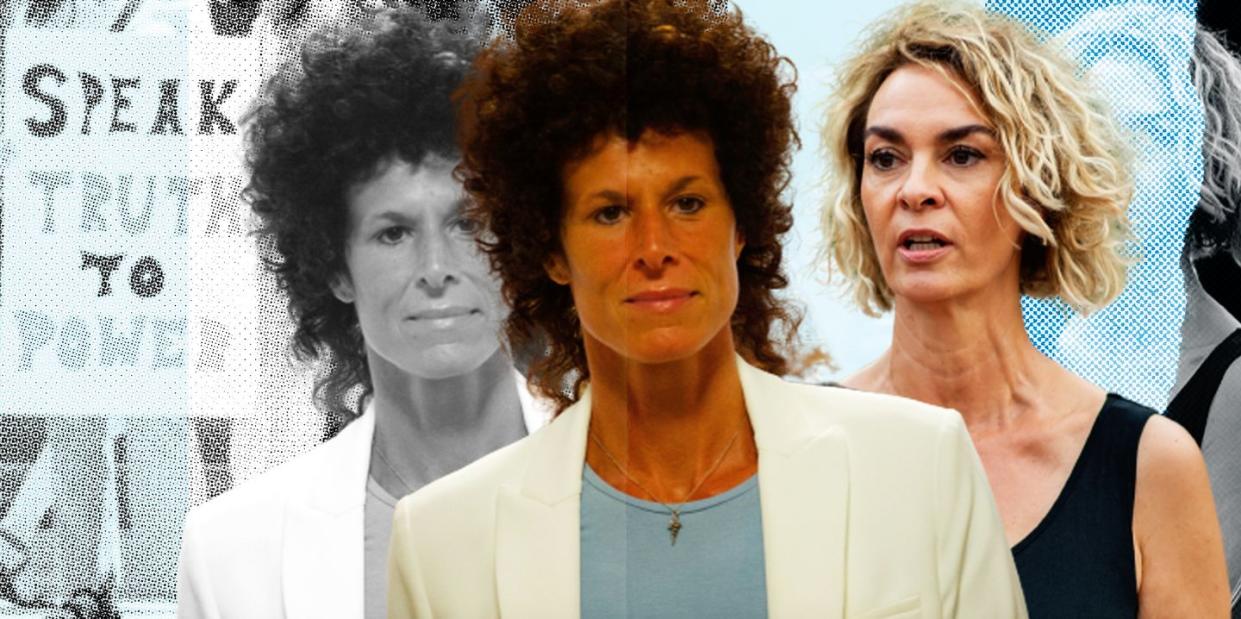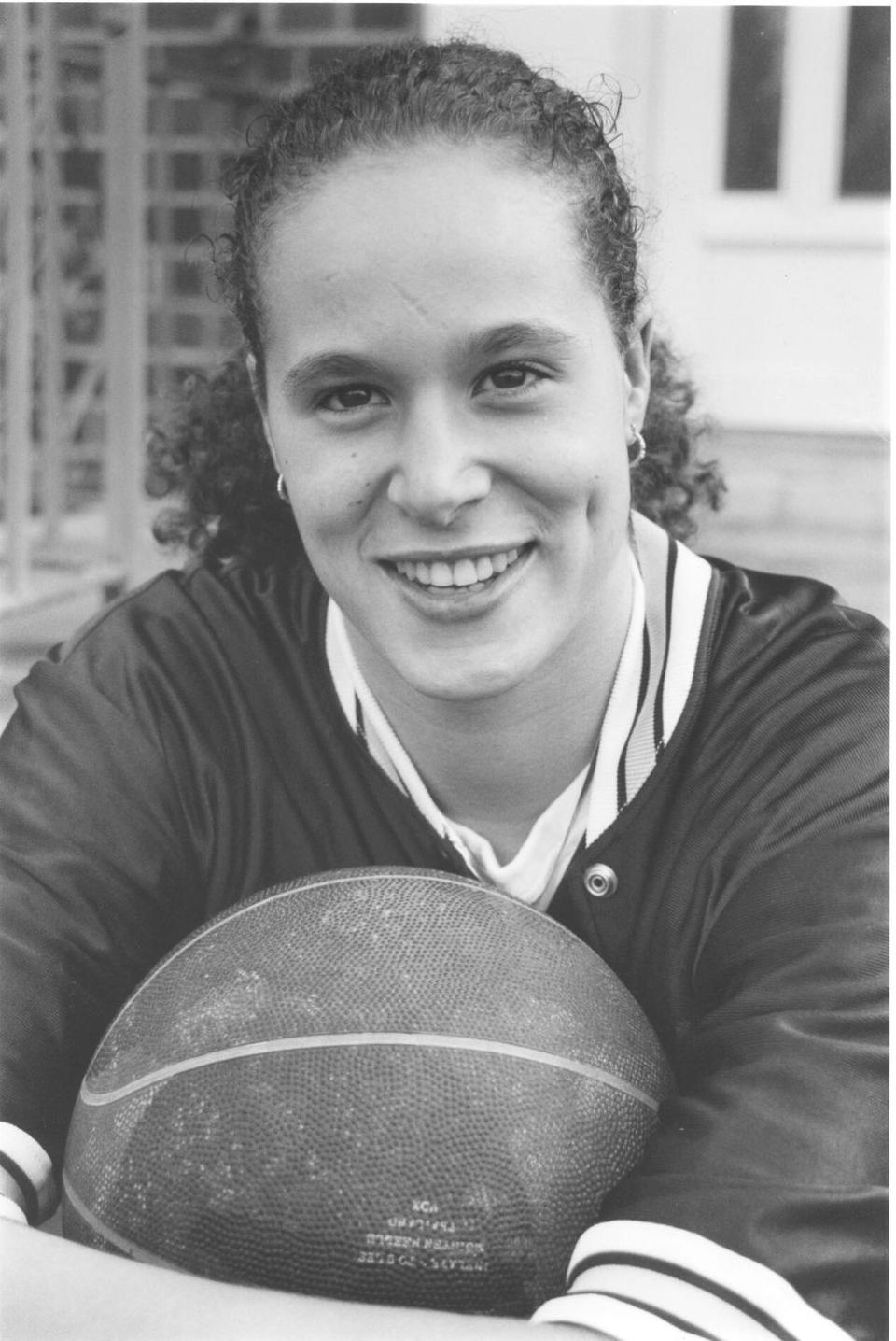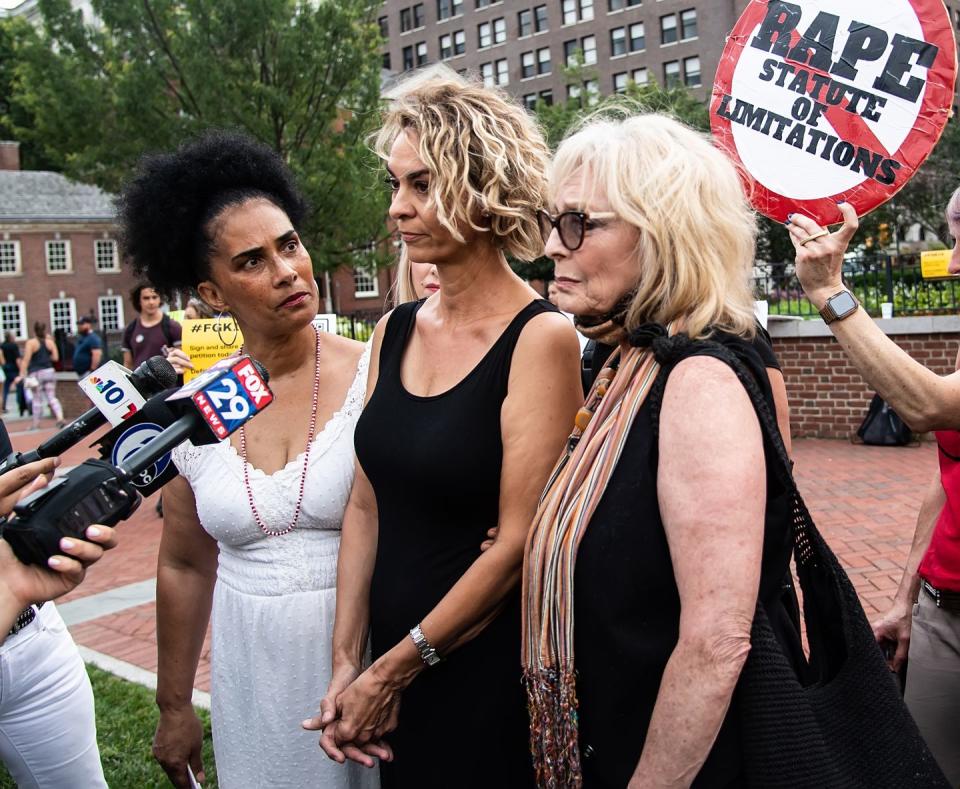Bill Cosby survivors are ready to change the narrative: "Speaking out was a great sacrifice"

- Oops!Something went wrong.Please try again later.
In 2005, when Andrea Constand first reported Bill Cosby for sexual assault, our approach to men abusing their positions of power, celebrity and influence was, shall we say… significantly more tolerant. Constand has since testified against Cosby in two criminal trials and one civil case, had her allegations dismissed, seen the first case declared a mistrial, secured a conviction and witnessed that conviction overturned, in a battle that has stretched over almost 20 years.
Constand was hailed by press and other survivors as the “Joan of Arc of the war on rape”. She was the first to publicly accuse Cosby, later discovering she was far from the only victim. Constand and Cosby met in 2002, when she was 29 and he was 65. She was working as Director of Operations for the women’s basketball team at his alma mater Temple University, Philadelphia, where he had a seat on the school’s board of executives. Over the course of a year, they struck up a friendship. In 2005, Constand alleged that Cosby had invited her to his house one evening, drugged and sexually assaulted her. She recalls waking up mid-assault, before passing out again. The aftermath was tough – her family noticed her change “drastically”. It took her a year to summon the strength to come forward.

“For so many years [Cosby] was front and centre, even winning awards after I had a lawsuit with him,” Constand, now 50, tells Cosmopolitan UK. [Cosby continued to be a success, even receiving prestigious awards which were later rescinded following his conviction]. “So, enough with the awarding him and let’s talk about sexual assault and what it really does to survivors, what it really does to families.”
A similar story of befriending and drugging has been recounted by many of Cosby’s accusers, suggesting an undeniable pattern. Five of them have now come together in two-part documentary The Case Against Cosby, to tell their stories.
To date, Cosby has been accused of sexual abuse by more than 60 women. In 2018, he was convicted of three counts of aggravated indecent assault against Constand and was sentenced to 3-10 years in prison — a landmark moment in the #MeToo movement. But today, Cosby walks free. In 2021, he was released early from prison, his conviction overturned due to a “process violation”. To understand why, we have to go back to 2006.
That year, when Constand brought a civil suit against Cosby, a deal was struck between the accused and the district attorney that would later grant Cosby immunity. Even though Cosby admitted to drugging women in order to have sex with them during his deposition, his participation in that civil case was agreed to under the condition that he would not face criminal charges for these actions. Call it a legal right, a technicality, or a loophole.
The US statute of limitations stipulates that accusers must report a crime within a certain timeframe (something that doesn’t exist in the UK). As a result, the opportunities for criminal charges against Cosby are now limited. But multiple civil suits have since been filed against the former comedian, including a 2022 case which found that he had sexually abused a 16-year-old girl at the Playboy Mansion in 1975. Earlier this year, nine more women came forward to sue Cosby over historic sexual assault claims between 1979 and 1992. Cosby denies all wrongdoing.
Since the tidal wave of accusations during the #MeToo movement, which came about in 2017 with the allegations against former Hollywood producer and convicted sex offender Harvey Weinstein, late into Constand’s own battle, we have become bleakly familiar with tales of hotel suites and board rooms, of promises of riches and fame, or more hauntingly, threats of ruined careers and reputations. And yet, despite our awareness of the networks of power that enabled so many abusers to operate for decades unchallenged, our focus has rarely been on the survivors.
As we now know, Constand was far from alone in her fight. In 1986, Stacey Pinkerton had been a model and an aspiring actor with a part in The Cosby Show [which was later cut] when she says he drugged and raped her in a hotel room in New York. She was 21, Cosby was around 49. In December last year, Pinkerton filed a civil suit against Cosby and NBC Universal.
Now Constand, alongside Pinkerton, 58 are determined to change the narrative and place survivors at the centre. The film sees them, alongside other Cosby accusers Dona Speir, Lise-Lotte Lublin and Renita Chaney Hill, as they each recount their harrowing experiences and come together to address the impact of trauma and the struggle of speaking out.
“Gathering together with the other women felt like something that just needed to be done,” Pinkerton tells Cosmopolitan UK. “So much of the forefront shows the perpetrator instead of our names and our faces and how we had to survive and how we had to change this around for us.”
One particularly poignant moment in the documentary sees Constand reflect on how the attack changed her. “The Andrea that walked in the door [of Cosby’s house] was not the Andrea that walked out the door. And my life has never been the same.” Later, Constand says “it ruined me”.
Across 1.5 hours, The Case Against Cosby sees how one man’s alleged actions unravelled so many lives. The film doesn’t address Cosby’s past as a beloved actor who was nicknamed “America’s dad” — because that is not the story. And that version has been told countless times. Instead, it focuses on the five survivors as they work with Canadian physician Gabor Maté (who shot to fame following his interview with Prince Harry) to confront their experiences and address misconceptions around the expected behaviour of sexual assault survivors. Interviews with the women are woven with analysis from psychologists, prosecutors and members of Constand’s family, around powerful scenes of the survivors together.
“I was labelled a con artist and a gold digger, they tried everything to bring me down. All I had was the truth, that was my power,” Constand says. For both women, speaking out has been a vital part of their healing process, but it has been far from easy. During the two criminal trials, Constand faced character assassination from defence counsel, Cosby fans and the media, yet she was determined to continue speaking out.
But while we’ve witnessed huge strides being made towards having these conversations and victims feeling able to come forward, Hollywood continues to overlook the behaviour of their darlings, awarding accolades and festival slots to accused. As we’ve seen play out countless times now, accusers of famous men are rarely treated kindly, and we’ve seen the industry willing to overlook the behaviour of their own. And for both Constand and Pinkerton, the fandom and support of Cosby has been an additional challenge to the process. Even now, says Pinkerton, CNN is promoting a new documentary (See it Loud: The History of Black Television), using Cosby in the trailer. “It has a really triggering effect on me, seeing his face,” she says.

Fighting against the weaponisation of the justice system against sexual assault survivors has become both women’s life’s work. Constand and Pinkerton now spend their time advocating for survivors and campaigning to establish a legal definition of consent in the US. It is this work that has helped Constand keep going. “When I look back at these quasi-20 years, I think this is my destiny. I had a purpose, I had a hand in a great movement,” she says.
The groundswell of testimonies during #MeToo from women no doubt contributed to a climate that led to Cosby’s eventual conviction, creating an environment that felt safe enough for more to speak out. This, says Constand, is the real success story, despite the overturning of Cosby’s conviction last year, after only serving two years in prison. “MeToo stirred up an age of accountability. I mean, look at Cosby – he’s facing several civil lawsuits. Laws are changing, the consciousness is changing, people are awakening to what has truly happened and how systems have been abusing people for a long, long time,” she says.
For Pinkerton, the Cosby allegations were the first drop in this ocean. “I don’t think [#MeToo] would have happened if we had not stood up with Andrea, and she was going through the case,” she says. “I think it gave the domino effect for other cases.”
It is this domino effect of survivors coming forward that can make real change, believe both women – who are keen to encourage people to speak, even if it seems like an immense difficulty. “Ultimately, you need women, or men or kids to be able to feel strong enough to stand up and say, ‘this happened to me’, to come forward,” says Constand. “Tell somebody if you're being harassed, tell somebody if, if something has happened to you just tell somebody just don't keep it a secret.”
The message both women want to impart through the film and their ongoing work is that there is life on the other side. “It was hard. It was a great sacrifice,” says Constand. “But I am living proof that you can go through something like that, and still be able to achieve all your dreams. I have taken it from a negative and turned it into something positive. And I hope that other survivors who are still sitting in silence out there can finally break their silence. It's just about finding a good community, knowing that you can have togetherness and that you're not alone in this.”
If you have been impacted by any of the issues in this article, you can contact Rape Crisis via their free helpline on 0800 500 2222 or on their website here.
The Case Against Cosby is on ITVX from 11 August
You Might Also Like

